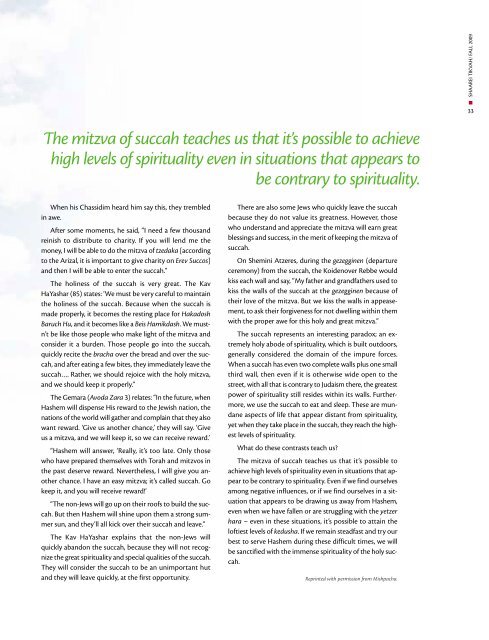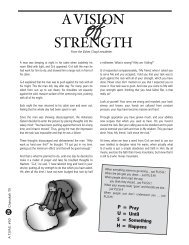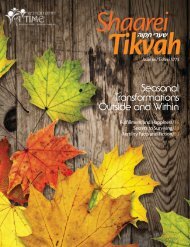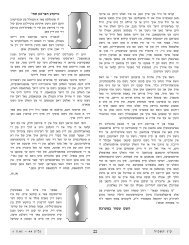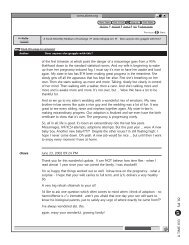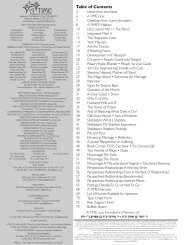Rosh Hashana 5770/2009 - Jewish Infertility
Rosh Hashana 5770/2009 - Jewish Infertility
Rosh Hashana 5770/2009 - Jewish Infertility
Create successful ePaper yourself
Turn your PDF publications into a flip-book with our unique Google optimized e-Paper software.
SHAAREI TIKVAH/ FALL <strong>2009</strong><br />
33<br />
The mitzva of succah teaches us that it’s possible to achieve<br />
high levels of spirituality even in situations that appears to<br />
be contrary to spirituality.<br />
When his Chassidim heard him say this, they trembled<br />
in awe.<br />
After some moments, he said, “I need a few thousand<br />
reinish to distribute to charity. If you will lend me the<br />
money, I will be able to do the mitzva of tzedaka [according<br />
to the Arizal, it is important to give charity on Erev Succos]<br />
and then I will be able to enter the succah.”<br />
The holiness of the succah is very great. The Kav<br />
HaYashar (85) states: ‘We must be very careful to maintain<br />
the holiness of the succah. Because when the succah is<br />
made properly, it becomes the resting place for Hakadosh<br />
Baruch Hu, and it becomes like a Beis Hamikdash. We mustn’t<br />
be like those people who make light of the mitzva and<br />
consider it a burden. Those people go into the succah,<br />
quickly recite the bracha over the bread and over the succah,<br />
and after eating a few bites, they immediately leave the<br />
succah…. Rather, we should rejoice with the holy mitzva,<br />
and we should keep it properly.”<br />
The Gemara (Avoda Zara 3) relates: “In the future, when<br />
Hashem will dispense His reward to the <strong>Jewish</strong> nation, the<br />
nations of the world will gather and complain that they also<br />
want reward. ‘Give us another chance,’ they will say. ‘Give<br />
us a mitzva, and we will keep it, so we can receive reward.’<br />
“Hashem will answer, ‘Really, it’s too late. Only those<br />
who have prepared themselves with Torah and mitzvos in<br />
the past deserve reward. Nevertheless, I will give you another<br />
chance. I have an easy mitzva; it’s called succah. Go<br />
keep it, and you will receive reward!’<br />
“The non-Jews will go up on their roofs to build the succah.<br />
But then Hashem will shine upon them a strong summer<br />
sun, and they’ll all kick over their succah and leave.”<br />
The Kav HaYashar explains that the non-Jews will<br />
quickly abandon the succah, because they will not recognize<br />
the great spirituality and special qualities of the succah.<br />
They will consider the succah to be an unimportant hut<br />
and they will leave quickly, at the first opportunity.<br />
There are also some Jews who quickly leave the succah<br />
because they do not value its greatness. However, those<br />
who understand and appreciate the mitzva will earn great<br />
blessings and success, in the merit of keeping the mitzva of<br />
succah.<br />
On Shemini Atzeres, during the gezegginen (departure<br />
ceremony) from the succah, the Koidenover Rebbe would<br />
kiss each wall and say, “My father and grandfathers used to<br />
kiss the walls of the succah at the gezegginen because of<br />
their love of the mitzva. But we kiss the walls in appeasement,<br />
to ask their forgiveness for not dwelling within them<br />
with the proper awe for this holy and great mitzva.”<br />
The succah represents an interesting paradox; an extremely<br />
holy abode of spirituality, which is built outdoors,<br />
generally considered the domain of the impure forces.<br />
When a succah has even two complete walls plus one small<br />
third wall, then even if it is otherwise wide open to the<br />
street, with all that is contrary to Judaism there, the greatest<br />
power of spirituality still resides within its walls. Furthermore,<br />
we use the succah to eat and sleep. These are mundane<br />
aspects of life that appear distant from spirituality,<br />
yet when they take place in the succah, they reach the highest<br />
levels of spirituality.<br />
What do these contrasts teach us<br />
The mitzva of succah teaches us that it’s possible to<br />
achieve high levels of spirituality even in situations that appear<br />
to be contrary to spirituality. Even if we find ourselves<br />
among negative influences, or if we find ourselves in a situation<br />
that appears to be drawing us away from Hashem,<br />
even when we have fallen or are struggling with the yetzer<br />
hara – even in these situations, it’s possible to attain the<br />
loftiest levels of kedusha. If we remain steadfast and try our<br />
best to serve Hashem during these difficult times, we will<br />
be sanctified with the immense spirituality of the holy succah.<br />
Reprinted with permission from Mishpacha.


